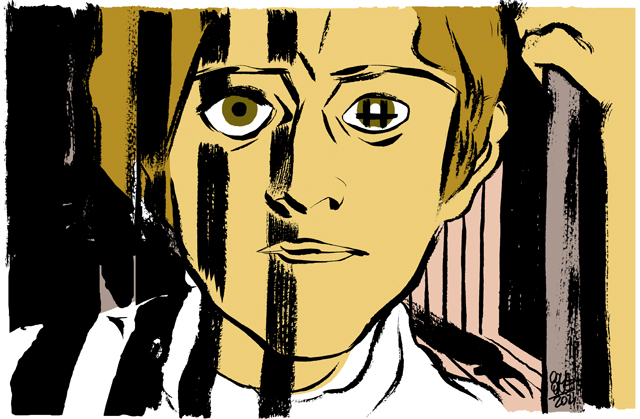Thinking about enclosed spaces after 2020
Abstract
The 2020 restrictions of freedom due to Covid-19 pandemic non-pharmaceutical interventions, such as stay-at-home orders – colloquially known as lockdowns – were significant, prolonged practices of estrangement which involved our perception of space. The situation we experienced urged us to question our understanding and use of space in new ways, such as: the categories, or metaphors we use to represent them, the distinctions we adopt to characterize places and spaces, among others.
The articles presented in this issue take up this challenge, proposing a reflection on different types of confined spaces, which span across different discourses and fields (literature, sociology, geography, architecture, etc.). The papers are inspired and stimulated – implicitly or not – by the spatial revolution, we all faced during the “lockdowns” of 2020.
Downloads
References
Id., “La distruzione dell’ospedale psichiatrico come luogo di istituzionaliz-zazione. Mortificazione e libertà dello ‘spazio chiuso’. Considerazioni sul sistema ‘open door’” (1965), Scritti 1953–1980, Ed. Franca Ongaro Basaglia, Milano ilSaggiatore, 2017b: 261-269.
Brecht, Bertolt, “Neue Technik der Schauspielkunst”, Schriften zumTheater, Bd. 3, Frankfurt am Main, Suhrkamp, 1963: 151-217
Id., “Über das experimentelle Theater”, Schriften zumTheater, Bd. 3, Frank-furt am Main, Suhrkamp, 1963: 79-106.
Clément, Gilles, Manifeste du Tiers paysage (2005), trad. it. Manifesto del Terzo Paesaggio, Macerata, Quodlibet, 2005.
Deleuze, Gilles, “Post-scriptum sur les sociétés de contrôle”, Pourparlers 1972 – 1990 (1990), trad. it. Pourparler, Macerata, Quodlibet, 2000.
Foucault, Michel, Surveiller et punir (1975), trad. it. Sorvegliare e punire. Nascita della prigione, Torino, Einaudi, 1976.
Id., “Space, Knowledge and Power” (1982), trad. it. “Spazio, sapere e pote-re”, Spazi altri. I luoghi delle eterotopie, Ed. Salvo Vaccaro, Milano, Mime-sis, 2001: 53-72.
Id., Le pouvoir psychiatrique. Cours ou Collége de France (1973-1974) (2003), trad. it. Il potere psichiatrico. Corso al Collège de France (1973-1974), Mila-no, Feltrinelli, 2015.
Jakob, Michael, Sulla panchina. Percorsi dello sguardo nei giardini e nell’arte, Torino, Einaudi, 2014.
La Pietra, Ugo, Il sistema disequilibrante, Milano, Edizioni Galleria Toselli, 1970.
Lussault, Michel, “Le Monde du virus – retour sur l’épreuve du confinement”, AOC – Analyse Opinion Critique, 10/05/2020; trad. it., “Il mondo del virus. Riflessioni sull’esperienza del lockdown”, Lasciate socchiuse le porte. Mobilità, attraversamenti, sconfinamenti, Eds. Beniamino Della Gala – Adrien Frenay – Filippo Milani – Lucia Quaquarelli, Roma, Armando, 2021: 15-25.
Milani, Filippo – Papotti, Davide, “Il pedone trasgressore. Pratiche proibite del camminare durante il lockdown”, Lasciate socchiuse le porte. Mobilità, attraversamenti, sconfinamenti, Eds. Beniamino Della Gala – Adrien Frenay – Filippo Milani – Lucia Quaquarelli, Roma, Armando, 2021: 41-62.
Nietzsche, Friedrich, Die fröhliche Wissenschaft, trad. it. La gaia scienza e Idilli di Messina, Milano, Adelphi, 1977.
Perrot, Michelle, “Gli spazi del privato”, Il romanzo, Ed. Franco Moretti, Torino, Einaudi, 2003: 495-519, IV.
Ead., Histoire de chambres (2009), trad. it. Storia delle camere, Palermo, Sellerio, 2011.
Vidler, Anthony, The Architectural Uncanny. Essays in the Modern Unhomely (1992), trad. it. Il perturbante dell’architettura. Saggi sul disagio nell’età contemporanea, Torino, Einaudi, 2006.
Wilde, Oscar, “The Decay of Lying”, trad. it., “La decadenza della men-zogna”, Saggi, Milano, Mondadori, 1981: 135-66.
Woolf, Virginia, A Room of One’s Own (1929), trad. it. Una stanza tutta per sé, Milano, Feltrinelli, 2020.
Copyright Notice
You are free to copy, distribute and transmit the work, and to adapt the work. You must attribute the work in the manner specified by the author or licensor (but not in any way that suggests that they endorse you or your use of the work).









